Pope Francis


Cardinal Timothy Dolan said Sunday that Pope Francis is asking the Catholic Church to look at the possibility of recognizing civil unions for gay couples, although the archbishop of New York said that he would be “uncomfortable” if the church embraced that position.
Francis said the churches in various countries must account for those reasons when formulating public policy positions. “We must consider different cases and evaluate each particular case,” he said.
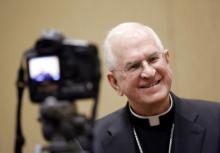
After I met Pope Francis during a visit to the Holy See in October, I remarked that if I were choosing a parish based upon the pastor, he would be my pastor. Now, he is the world’s pastor.
Since his election a year ago on March 13, Pope Francis has provided inspiration in many ways:
As a communicator, he speaks in a fresh and creative yet very simple style. And like Jesus, he uses images that people understand while communicating profound theological truth. Forthright, authentic, and courageous in his communication, Pope Francis also humorously challenges us, as he calls us not to be “sourpusses,” “whiners,” or “princes.”
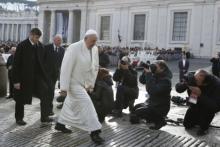
When cardinals gathered in the Sistine Chapel a year ago to choose a successor to Pope Benedict XVI, a frail 85-year-old who had become the first pope in six centuries to resign, many of them had one non-negotiable for the next pontiff: that he not be over 70 years old.
So what did the cardinals do? They elected 76-year-old Cardinal Jorge Bergoglio of Argentina — a man who had part of a lung removed in his 20s and who today “walks kind of crookedly,” as a former aide once put it, because he wears orthopedic shoes to help alleviate chronic lower back pain.
All in all, though, Pope Francis, now 77, seems to be doing quite well at the one-year mark of his papacy, despite maintaining a nonstop pace of liturgies, meetings, public appearances, and hours of prayer throughout a day that starts before 5 a.m.
“He eats works, it’s true,” said the Rev. Antonio Spadaro, a Jesuit priest — like Francis — who conducted a book-length interview with the pope last year and knows him well.

As Pope Francis approaches the one-year mark of his papacy, his global flock and a fascinated public are starting to measure the changes he is making against the sky-high hopes for transforming an institution many thought impervious to change.
Every personnel move and every new proposal is being scrutinized for what it might indicate about the direction of the church, what it might augur about possible adjustments to church teaching and whether the aspirations of so many will be fulfilled — or frustrated.
But as important as such structural and policy moves can be, church leaders and Vatican insiders say the 77-year-old Francis is really focused on a more ambitious (and perhaps more difficult) goal: overhauling and upending the institutional culture of Catholicism.
Francis, they say, is bent on converting the church, as it were, so that the faith is positioned to flourish in the future no matter who follows him to the throne of St. Peter.
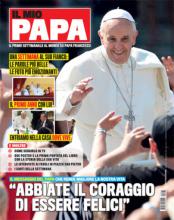
Il Mio Papa, a new weekly magazine that will focus entirely on Pope Francis — complete with a weekly centerfold poster of the pontiff — is scheduled to hit Italian newsstands on Wednesday.
The magazine, whose name translates to “My Pope,” will go heavy on photography and colorful layouts, according to a news release from publisher Mondadori. It’s the first magazine entirely devoted to just one pontiff.
The magazine will include stories about people and events that inspire the pope; background information on papal remarks; a “saints of the week” column; a collection of international cartoons about the pope; and a list of that week’s television programs dedicated to issues related to faith and Christianity.
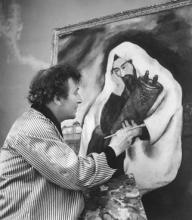
Novelist Chaim Potok captured the strain of transition from religious traditionalism to artistic expression in the fictional character Asher Lev. Asher, a young painter prodigy and son of a Hasidic luminary, is drawn to a Brooklyn museum where he surreptitiously views crucifixions and nudes. He then goes on to paint such scenes.
Asher’s mother tries to understand her son’s artistic longings, yet says in exasperation, “Your painting. It’s taken us to Jesus. And to the way they paint women. Painting is for goyim, Asher. Jews don’t draw and paint.”
Asher responds, “Chagall is a Jew,” but his mother cuts him off.
“Religious Jews, Asher. Torah Jews. Such Jews don’t draw and paint.”
Returning from a trip to Europe, Asher’s father sees the crucifixion drawings. In a rage, he asks his son if he knows “how much Jewish blood had been spilled because of that man?”


In another strongly worded message to the Catholic hierarchy, Pope Francis on Thursday told the Vatican body that vets nominees for bishops that they need to find him better candidates to send to dioceses around the world.
“To choose such ministers we all need to raise our sights, to move to a higher level,” Francis told the Congregation for Bishops, the critical department of the Roman Curia that acts as a clearinghouse for bishop nominees. “We can’t do anything less, and we can’t be content with the bare minimum.”
On consecutive days last weekend, Francis delivered stern warnings to 19 new cardinals he appointed to join about 150 others in the College of Cardinals: On Saturday, he told them to avoid “rivalry, jealousy, factions,” and at a Mass in the Vatican on Sunday, he said they must reject “habits and ways of acting typical of a court: intrigue, gossip, cliques, favoritism, and preferences.”
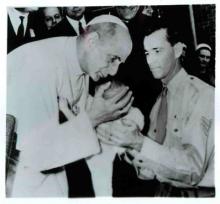
Vatican theologians have given their approval to a miracle attributed to the intercession of Pope Paul VI, moving him a step closer to sainthood.
The team of medical professionals and doctors that advise the Vatican’s Congregation for the Causes of Saints already had approved the same miracle in December. Now that a panel of theologians has signed off, the miracle only requires a review by Pope Francis to be considered official.
When that happens, Paul will be beatified — the final step before sainthood. A second miracle is typically required for canonization.
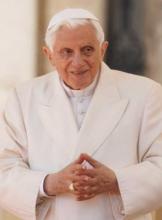
As the anniversary of his surprising resignation approaches, Pope Benedict XVI has rejected as “simply absurd” the speculation that he was forced to step down, and he said he still wears the distinctive white papal cassock for “purely practical reasons.”
“At the moment of my resignation there were no other clothes available,” Benedict wrote in a brief letter to an Italian journalist that was published on Wednesday.
The emeritus pope also said that he kept the name Benedict, rather than reverting to his birth name of Joseph Ratzinger, because it was a simple solution.
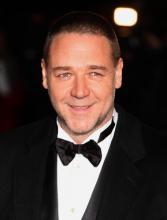
Actor Russell Crowe is using social media to try to cajole Pope Francis into seeing his latest film, the controversial “Noah,” which stars Crowe as the waterlogged biblical patriarch.
The $125 million film, which will go into wide release next month, already has some religious groups upset over a story line they say takes too many liberties in director Darren Aronofsky’s adaptation to the silver screen. Crowe says he’d like Francis to see the film to make up his own mind.
Crowe — who won an Oscar 14 years ago for “Gladiator,” which was set in ancient Rome — tweeted an invitation to the pope, reading in part, “The message of the film is powerful, fascinating, resonant.”
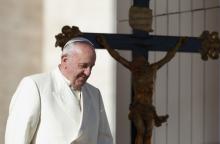
Pope Francis on Tuesday lashed out at public indifference to the many wars raging around the globe, with especially harsh words for arms makers who he said profit from the violence and suffering.
“Think of the starving children in the refugee camps. Just think of them: this is fruit of war!” Francis said at the daily Mass he celebrates in the chapel of the Vatican guesthouse where he lives.
“And if you want,” he continued, “think of the great dining halls, of the parties thrown by the bosses of the weapons industry that makes the arms that wind up [in those camps]. A sick child, starving, in a refugee camp — and the great parties, the fine life for those who manufacture weapons.”
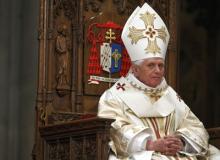
When Pope Benedict XVI officially left the Vatican in a helicopter a year ago this week, becoming the first pontiff in 600 years to resign, many in his conservative fan base were aghast, even angry.
He has betrayed us, said those who thought Benedict’s papacy would be the final triumph of old-school Catholicism. He has undermined the papacy itself, they worried. Lightning even struck the cupola of St. Peter’s Basilica hours after Benedict departed, surely a bad omen.
Rumors that he was suffering from a terminal illness were taken as gospel truth. After all, what else could explain Benedict’s unorthodox decision to abandon the Throne of St. Peter?
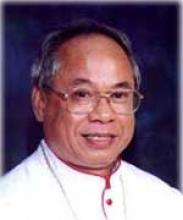

Pope Francis on Monday launched a sweeping reform of the Vatican’s scandal-plagued financial system by naming one of his closest advisers on reform, Australian Cardinal George Pell, to head a powerful new department that will oversee the Vatican bank and the entire economic system of the Holy See.
The new Secretariat for the Economy, with Pell acting as a unique kind of Vatican comptroller, will have “authority over all economic and administrative activities” in the Vatican, according to a statement summarizing Francis’ decree.
The changes also provide for an official who will be empowered “to conduct audits of any agency of the Holy See and Vatican City State at any time” — a remarkable degree of authority in a bureaucracy where offices are known for zealously guarding their own turf.

Pope Francis created his first batch of new cardinals on Saturday and used the ceremony to launch a new appeal for peace amid the violence racking so many countries.
Francis focused his remarks on the plight of Christians, but in an extemporaneous addition to his prepared text he also called on the church “to fight any discrimination” and “exclusion.”
“The church needs your compassion, especially at this time of pain and suffering for so many countries throughout the world,” Francis told the 18 new cardinals who were present in St. Peter’s Basilica, along with hundreds of other cardinals and bishops whose colorful vestments and diverse origins offered a grand tableau of global Catholicism.
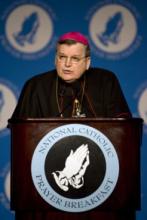
As Pope Francis led the world’s cardinals in talks aimed at shifting the church’s emphasis from following rules to preaching mercy, a senior American cardinal took to the pages of the Vatican newspaper on Friday to reassure conservatives that Francis remains opposed to abortion and gay marriage.
Cardinal Raymond Burke acknowledged that the pope has said the church “cannot insist only on issues related to abortion, gay marriage, and the use of contraceptive methods.” But in his toughly worded column in L’Osservatore Romano, the former archbishop of St. Louis blasted those “whose hearts are hardened against the truth” for trying to twist Francis’ words to their own ends.
Burke, an outspoken conservative who has headed the Vatican’s highest court since 2008, said Francis in fact strongly backs the church’s teaching on those topics. He said the pope is simply trying to find ways to convince people to hear the church’s message despite the “galloping de-Christianization in the West.”
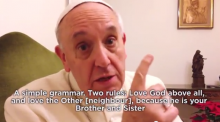
In an unusually informal video made on a smartphone held by a Pentecostal pastor, Pope Francis called on all Christians to set aside their differences, explaining his “longing” for Christian unity.
The seven-minute video, which was posted on YouTube, was made during a Jan. 14 meeting with Anthony Palmer, a bishop and international ecumenical officer with the independent Communion of Evangelical Episcopal Churches. Italian news reports say that the pope and Palmer knew each other when Francis served as the archbishop of Buenos Aires.
In his remarks, part of a 45-minute video, Francis said, in Italian, that all Christians are to blame for their divisions and that he prays to the Lord “that he will unite us all.”
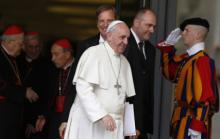
Pope Francis on Thursday opened a major two-day meeting on the church’s approach to the complexities of modern family life, telling the world’s Catholic cardinals that the church needs a “pastoral” approach that is “intelligent, courageous, and full of love” and not focused on abstract arguments.
In brief introductory remarks released by the Vatican, Francis pushed the closed-door summit of about 150 cardinals to “deepen the theology of the family and discern the pastoral practices which our present situation requires.”
He asked that they do so “thoughtfully” and by keeping the focus on “the beauty of family and marriage” while at the same time showing that the church is ready to help spouses “amid so many difficulties.” Francis added the phrase “intelligent, courageous, and full of love” extemporaneously.
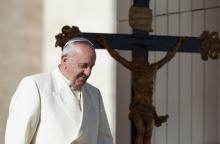
High-level debates over Catholic teachings on marriage and divorce and other hot-button issues heated up on Wednesday as a highly anticipated effort to overhaul the Vatican bureaucracy slogged through the devilish details of financial reform.
The multitrack talks launched months ago by Pope Francis ramped up this week as some 185 cardinals converged on Rome to watch the pontiff add 19 new members to their select ranks this weekend, part of what some called “the most critical week” of Francis’ year-old papacy.
Anticipation is mounting for a series of closed-door discussions on Thursday and Friday, when the cardinals will hold what are expected to be frank talks about issues such as contraception, cohabitation, gay marriage, and whether divorced and remarried Catholics can receive Communion.